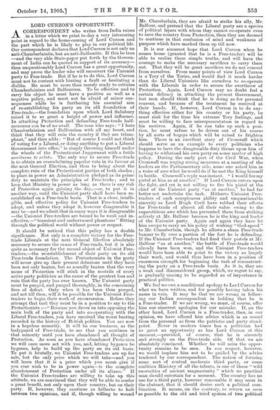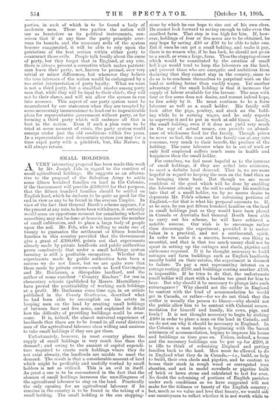in a letter which we print to-day a very interesting
point in regard to the home-coming of Lord Curzon and the part which he is likely to play in our political life. i Our correspondent declares that Lord Curzon s not only an anti-Chamberlainite, but an anti-Balfourite. If this be true —and the very able State-paper put forth by the Govern- ment of India can be quoted in support of its accuracy— then unquestionably Lord Curzon has a great opportunity, and may prove the leader who will reconvert the Unionist party to Free-trade. But if he is to do this, Lord Curzon must not be content with hinting a fault or hesitating a dislike. He must be more than merely ready to criticise Chamberlainism and Balfourism. To be effective and to carry his object he must have a positive as well as a negative policy, and must not be afraid of minor con- sequences while he is furthering his essential aim of re-establishing his party on its old foundation of Free-trade,—the foundation upon which Lord Salisbury raised it to so great a height of power and influence. In attacking Protection and. defending Free-trade half- measures can be of no avail. The man who says : "I hate Chamberlainism and Balfourism with all my heart, and think that they will ruin the country if they are trium- phant," and then adds : "But of course I could not think of voting for a Liberal, or doing anything to put a Liberal Government into office," is simply throwing himself under the wheels of the Protectionist Juggernaut with a futile Inorituras te salute. The only way to secure Free-trade is to obtain an overwhelming popular vote in its favour at the next General Election, and thus to bring about the complete ruin of the Protectionist parties of both shades ; to place in power an Administration pledged as its prime duty to maintain the principles of Free-trade ; and to keep that Ministry in power as long as there is any risk of Protection again gaining the day,—or, to put it in another way, until the Unionist party shall have been re- established on a Free-trade basis. That is a clear, intelli- gible, and effective policy for Unionist Free-traders to adopt, and unless they adopt it, however disagreeable it may be—and we admit that in many ways it is disagreeable —the Unionist Free-traders are bound to be weak and in- effective,—" transient and embarrassed phantoms" flitting through the political world without power or respect.
It should be noticed that this policy has a double significance. Not only is a complete victory for the Free- trade Liberals at the next General Election absolutely necessary to secure the cause of Free-trade, but it is also quite as necessary for the second object of Unionist Free- traders,—the re-establishment of their party on its old Free-trade foundation. The Protectionists in the party will never give up their present delusions until they have been not only beaten, but so soundly beaten that the very name of Protection will stink in the nostrils of every active party politician as the cause of the greatest loss and ruin that the party has ever known. The Unionist party must be purged, and purged thoroughly, in the consuming fires of defeat. Only when it has been thus purged, and not till then, will it be possible for the Unionist Free- traders to begin their work of reconversion. Before they attempt that task they must be in a position to say to the Protectionists :—" Because you drove us into opposing the main bulk of the party and into co-operating with the Liberal Free-traders, you have received the worst beating recorded in the history of British politics. You are now in a hopeless minority. It will be our business, as the bodyguard of Free-trade, to see that you continue in that minority until you have abandoned all thought of Protection. As soon as you have abandoned Protection we will once more act with you, and, letting bygones be bygones, help to build up the party on its old basis. To put it brutally, we Unionist Free-traders are up for sale, but the only price which we will take—and you will learn that it is a price which you must. give if you ever wish to be in power again—is the complete abandonment of Protection under all its aliases." If the Unionist Free-traders are willing to take up this attitude, we are convinced that they will be able to confer a great benefit, not only upon their country, but on their party. If, however, they continue as hitherto to halt between two opinions, and if, though willing to wound Mr. Chamberlain, they are afraid to strike his ally, Mr. Balfour, and pretend that the Liberal party are a species of political lepers with whom they cannot co-operate even to save the country from Protection, then they are doomed to continue in that confusion of mind and weakness of purpose which have marked them up till now.
It is our sincerest hope that Lord Curzon when he comes home (granted that he is a Free-trader) will be able to realise these simple truths, and will have the courage to make the necessary sacrifices to carry them out. That they will be great sacrifices we do not conceal from ourselves. From many points of view Lord Curzon is a Tory of the Tories, and would find it much harder than do Liberal Unionists like ourselves to co-operate with the Liberals in order to secure the overthrow of Protection. Again, Lord Curzon may no doubt feel a certain delicacy in attacking the present Government, lest men should think that he is doing so for personal reasons, and because of the treatment he received at their hands. If, however, Lord Curzon is to do any- thing effective either for his country or his party, he must sink for the time his extreme Tory feelings, and must be wane. to face misrepresentation in regard to his motives. willing if he can take up such a posi- tion, he must refuse to be driven out of his course by all sorts of bogeys which will be raised to frighten him. There is an excellent story of Cromwell which should serve as an example to every politician who happens to have the disagreeable duty thrust upon him of having to withstand his own party on some matter of high policy. During the early part of the Civil War, when Cromwell was urging strong measures at a meeting of the leaders on the Parliamentary side, some one asked him in a voice of awe what he would do if he met the King himself in battle. Cromwell's reply was instant. "I would fire my pistol at him as at another." If Lord Curzon enters upon the fight, and yet is not willing to fire his pistol at the chief of the Unionist party "as at another, be had far better not undertake the task. Hitherto Unionist Free- traders of such conspicuous ability and unquestionable sincerity as Lord Hugh Cecil have robbed their efforts for Free-trade of almost all their value owing to the superstitious awe which has prevented them from striking actively at Mr. Balfour because he is the king and leader of the Unionist party. Again and again they have let him escape to carry on his policy of wishing " God-speed " to Mr. Chamberlain, though he allows a sham Free-trade banner to fly over a portion of the fort he is defending. If the Unionist Free-traders had fired their pistols at Mr. Balfour "as at another," the battle of Free-trade would already have been won, and the Unionist Free-traders would have been able to point to the victory as largely their work, and would thus have been in a position of enormous strength for beginning the task of reconstruct- ing the party on a Free-trade basis. As it is, they are a weak and disconsidered group, which, we regret to say, is gradually ceasing to be regarded as of importance in practical politics.
We feel we owe a conditional apology to Lord Curzon for what we have written, and for possibly having taken his name in vain. It may be that we are wrong in follow- ing our Indian correspondent in holding that he is a Free-trader. If we are wrong, we must, of course, offer him our sincerest apologies for our mistake. If, on the other hand, Lord Curzon is a Free-trader, then, in our opinion, we have offered him advice which is as sound from the personal as from the patriotic and party stand- point. Never in modern times has a politician had so great an opportunity as has Lord Curzon at this moment,—provided, of course, that he is sincerely and strongly on the Free-trade side. Of that we are absolutely convinced. Whether he will seize the oppor- tunity remains to be seen. In one respect, however, we would implore him not to be guided by the advice tendered by our correspondent. The notion of forming some sort of central moderate third party, or some coalition Ministry of all the talents, is one of those "wild enormities of ancient magnanimity" which no practical man should entertain for a moment. The country has no use for a third party, however reasonable it may seem in the abstract, that it should desire such a political com- bination. It means, on the contrary, to return as soon as possible to the old and tried system of two political parties, in each of which is to be found a body of moderate men. These two parties the nation will use as heretofore as its political instruments, con- scious that if at any time the party principle over- runs its bounds, and the necessary evils of the system become exaggerated, it will be able to rely upon the patriotism of the best section within either party to counteract those evils. People talk loudly about the curse of party, but they forget that in England, at any rate, there is always present a corrective which makes patriotic men leave their party, not, heaven be praised, over very trivial or minor differences, but whenever they believe the true interests of the nation would be endangered by a too strict interpretation of party loyalty. What we want is not a third party, but a steadfast resolve among party men that, while they will be loyal to their chiefs, they will not be their slaves, and will not allow the system to run into excesses. This aspect of our party system must be remembered by our statesmen when they are tempted by some momentary inconvenience to lend ear to impracticable pleas for representative government without party, or for forming a third party which will embrace all that is best in the nation. Even if such a plan were to be tried at some moment of crisis, the party system would emerge under just the old conditions within five years. In a representative and democratic system you may for a time expel party with a pitchfork, but, like Nature, it will always return.















































 Previous page
Previous page